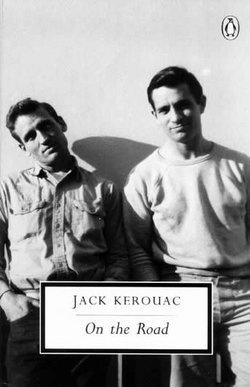 |
| Cover picture from The Great Book Swap |
Author
Jean-Louis "Jack" Kerouac, a Canadian-American novelist and poet. He is considered a literary iconoclast, and alongside William S. Burroughs and Allen Ginsberg, a pioneer of the Beat Generation.Summary
It is a largely autobiographical work that was based on the spontaneous road trips of Kerouac and his friends across mid-century America. It is often considered a defining work of the postwar Beat Generation that was inspired by jazz, poetry, and drug experiences. While many of the names and details of Kerouac's experiences are changed for the novel, hundreds of references in On the Road have real-world counterparts. (source: Wikipedia)
Status
Unexpectedly for such a classic, it took me a trip to several bookstores (first in Mumbai, afterwards in Leuven) before I could find this book in the shelves. It was possible to order it or to get a translated version, but in the end I found it in Leuven and in English.
Back in Tamale, I first lent it out to Malene, a Danish journalist working in Ghana for IBIS. As she had already devoured her complete stack of books, I supplied her with some extra stock, including this book. She returned all with some extra books as compensation, thank you very much!
Then finally, I read this book while I was temporarily doomed to an (almost) immobile life caused by an ankle fracture. This probably enhanced my thirst to unrestricted travelling and living a careless life. I desired to stand at the road, stick my thumb in the air and let me get carried away to other destinations.
I have no opinon on the literary value of this novel, but for me it was a real pageturner. Kerouac describes the situations without any judgement or any attempt of making scenes more "picturesque" than they are. The descriptions of the actions taken felt very "raw" to me, limited to the facts and without emotion so that the judgement is not made by the author but has to be made by the reader of the book. Only facts were mentioned so that the read had space for his own emotions, to create his own impression. Or did Kerouac want us to think less and experience more?
Anyway, describing the situations without judgement, made the story go very fast and left a big impression on me. The less emotion there was in the book, the more it made me feel as I could live the situation itself, based on the facts described and putting my own judgement on it without being disturbed by the opinion of the author.
After reading, I presented the book to Sandra, my friendly German neighbour, before she was taking off to New York.
Back in Tamale, I first lent it out to Malene, a Danish journalist working in Ghana for IBIS. As she had already devoured her complete stack of books, I supplied her with some extra stock, including this book. She returned all with some extra books as compensation, thank you very much!
 |
| Picture taken from Long Way Down |
Then finally, I read this book while I was temporarily doomed to an (almost) immobile life caused by an ankle fracture. This probably enhanced my thirst to unrestricted travelling and living a careless life. I desired to stand at the road, stick my thumb in the air and let me get carried away to other destinations.
I have no opinon on the literary value of this novel, but for me it was a real pageturner. Kerouac describes the situations without any judgement or any attempt of making scenes more "picturesque" than they are. The descriptions of the actions taken felt very "raw" to me, limited to the facts and without emotion so that the judgement is not made by the author but has to be made by the reader of the book. Only facts were mentioned so that the read had space for his own emotions, to create his own impression. Or did Kerouac want us to think less and experience more?
Anyway, describing the situations without judgement, made the story go very fast and left a big impression on me. The less emotion there was in the book, the more it made me feel as I could live the situation itself, based on the facts described and putting my own judgement on it without being disturbed by the opinion of the author.
After reading, I presented the book to Sandra, my friendly German neighbour, before she was taking off to New York.
No comments:
Post a Comment